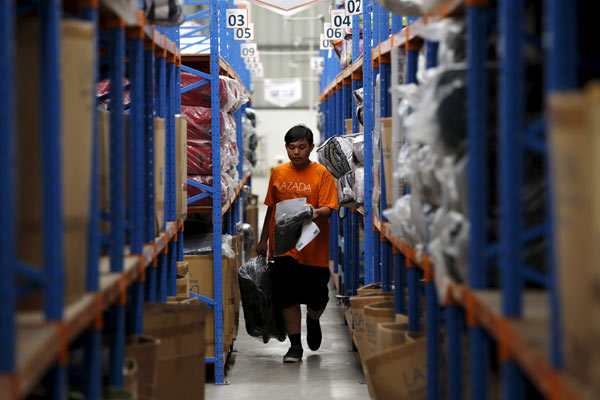Alibaba bets big on Thai prospects

A worker fills an order at the Lazada's warehouse in Jakarta, Indonesia. [Photo/Agencies]
Alibaba Group Holding Ltd expects to complete the construction of an e-commerce and logistics hub in Thailand by 2019, taking the internet behemoth closer to Southeast Asian economies and its goal of shedding its reliance on the Chinese market.
Building of the park is on a "steady course" and marks the company's long-term investment in Thailand, Alibaba said in an emailed statement to China Daily.
Under an agreement with the Thai government in December, Alibaba vowed to help develop the country's e-commerce sector through providing training to small businesses and individuals, and exploring ways to enhance its logistics capabilities.
Alibaba said the hub is designed to provide a one-stop service connecting SMEs, manufacturers, service providers and logistic partners, complementing its existing investment in Lazada Group, a dominant regional e-commerce platform in which Alibaba hold s a majority stake.
"We hope the park will empower Thailand's innovative internet startups and boost the country's technology ecosystem," the statement added.
Under the agreement, Alibaba and its subsidiary Lazada will offer e-commerce training to 30,000 Thai SMEs to aid their access to both domestic and international e-commerce platforms and nurture software developers.
The deal also calls for Alibaba to advise the country's postal service-Thailand Post-on shipping and logistics.
The Chinese online giant is marching into a region on the cusp of a digital shopping boom fueled by fast-growing mobile phone usage.
Consultancy eMarketer projects that e-commerce sales, excluding travel, will grow at a rate exceeding 15 percent in Thailand annually over the next four years, reaching $5.69 billion by 2020.
In a similar move, Alibaba in March established the first digital free trade zone dubbed Electronic World Trade Platform in Malaysia, offering small businesses lower barriers for entry and easier access to financing.
"Alibaba's investment here will be different from that in Malaysia, where it is expected to be an e-commerce platform only. In contrast, its investment in Thailand will be broader, covering production platforms ... particularly in Cambodia, Laos, Myanmar and Vietnam," Thai Industry Minister Uttama Savanayana was quoted by the Bangkok Post as saying.





 play
play